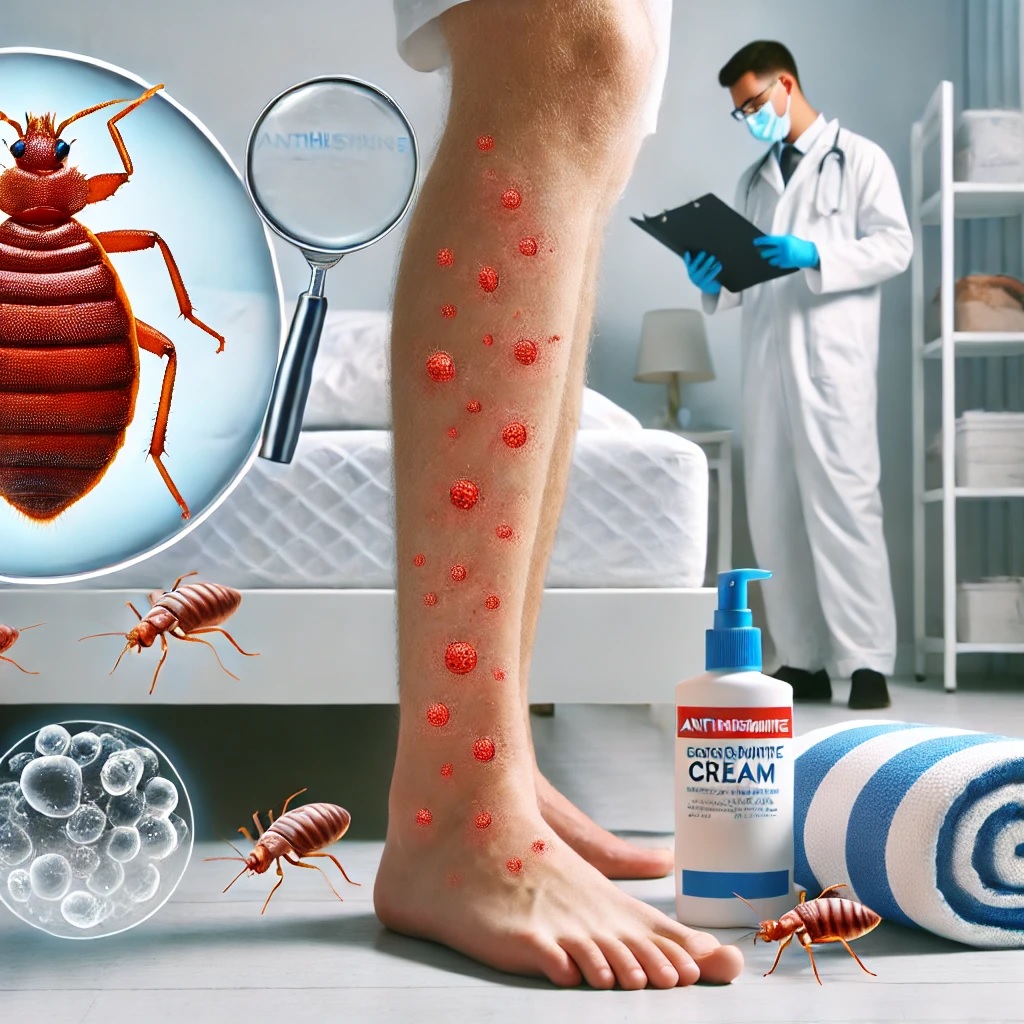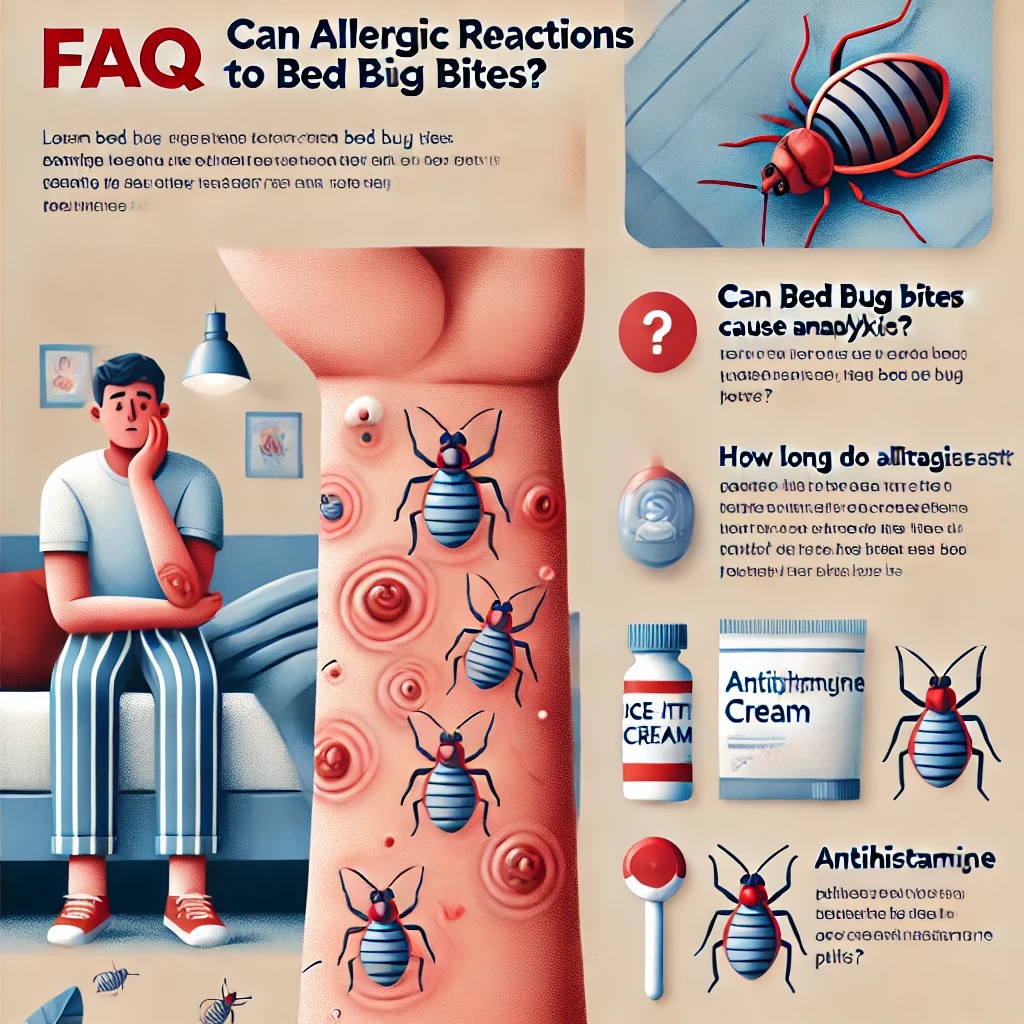Waking up to the sight of bed bug bites is bad enough, but for some, it’s not just about the itching – it can trigger allergic reactions that make the whole experience far worse. At ThermoPest, we’ve seen how bed bug infestations can impact people’s health, particularly those who suffer from allergic reactions to their bites. Let’s dive into why these reactions happen, what to look for, and how to treat them effectively.

Why Do Some People Have Allergic Reactions to Bed Bug Bites?
Most people will have some sort of reaction to bed bug bites, but the severity can vary. The reason behind this? It all comes down to how your body reacts to the proteins in bed bug saliva. When a bed bug bites, it injects a bit of its saliva into the skin, which helps them feed. For some, this is no big deal, but for others, their immune system jumps into action, causing an allergic response.
If you’ve ever had bed bug bites and found them especially itchy or swollen, you might be in that camp. Let’s break down what these allergic reactions actually look like.
Symptoms of Allergic Reactions to Bed Bug Bites
Common Signs of an Allergic Reaction
For most people, bed bug bites leave behind small, red, itchy welts, but for those with allergies, things can get a bit more intense. You might notice:
- Red, swollen areas that are larger than normal.
- Hives or raised patches of skin around the bites.
- Intense itching that doesn’t go away with normal treatments.
- In some cases, blisters form at the bite site.
These symptoms can make the whole experience far more uncomfortable. A client of ours once shared how they had to constantly ice their bites and apply antihistamine creams because the itching was unbearable!
Severe Reactions
While rare, some people can have severe allergic reactions to bed bug bites. This can include more extreme symptoms, such as widespread swelling or difficulty breathing – signs of a possible anaphylactic reaction. It’s important to stress that anaphylaxis due to bed bug bites is very uncommon, but if you’re ever experiencing breathing difficulties after a bite, seek medical help immediately.
Delayed Reactions
One thing that can throw people off is the delayed reaction. Unlike mosquito bites, which you might notice straight away, allergic reactions to bed bug bites can take hours or even days to appear. This delay often leads people to misidentify the source of the bites, making it even harder to track down the infestation.
Causes of Allergic Reactions to Bed Bug Bites
Proteins in Bed Bug Saliva
The main culprit behind allergic reactions is the protein in bed bug saliva. When a bed bug bites, this protein is injected into your skin, and it’s your body’s immune system that reacts to it. In some people, this causes inflammation and itching, while in others, the reaction can be much more severe.
Immune System Sensitivity
Some people’s immune systems are just more sensitive to allergens, whether it’s bed bugs, pollen, or pet dander. If you’re someone who tends to react strongly to insect bites, you might find bed bug bites particularly troublesome.
Diagnosing an Allergic Reaction to Bed Bug Bites
How to Differentiate Allergic Reactions from Regular Bites
Bed bug bites can be tricky to identify because they often look like bites from other insects, but when you’re dealing with an allergic reaction, there are a few things to keep an eye out for. If the bite site is particularly swollen, blistering, or itching intensely, it could be an allergic reaction rather than just a typical bite.
When to See a Doctor
Most bed bug bites can be treated at home, but if your symptoms get worse or you notice signs of infection, it’s worth seeing a doctor. If the area around the bites becomes red and inflamed, feels hot to the touch, or if you experience difficulty breathing, it’s time to seek medical help. At ThermoPest, we always encourage our clients to err on the side of caution, especially when allergies are involved.
Treatment for Allergic Reactions to Bed Bug Bites
Home Remedies for Mild Reactions
For mild allergic reactions, there’s plenty you can do at home. The goal here is to reduce itching and swelling while keeping the bite area clean. Here’s what we recommend:
- Wash the area with soap and water: This can help reduce the risk of infection and soothe the skin.
- Apply an ice pack: Ice helps reduce swelling and numbs the area, offering some much-needed relief.
- Use anti-itch creams: Over-the-counter anti-itch creams like calamine lotion or hydrocortisone can make a big difference.
Over-the-Counter Medications
If the itching is intense, you might want to consider antihistamine creams or oral antihistamines like loratadine or cetirizine. These will help calm the body’s allergic response, reducing itching, swelling, and redness. These remedies are easy to find and work well for most mild to moderate reactions.
Medical Treatment for Severe Reactions
In cases where the reaction is more severe, it’s important to seek medical advice. Doctors may prescribe stronger antihistamines, steroid creams, or, in rare cases, epinephrine if anaphylaxis is a concern. The good news is that this level of reaction is rare, but it’s always better to be prepared.
Preventing Allergic Reactions
Avoiding Bed Bug Bites
The best way to prevent allergic reactions? Avoid getting bitten in the first place. Using bed bug-proof mattress encasements can be a lifesaver. These encasements trap bed bugs inside and stop new ones from making a home in your mattress or pillows. We always recommend these to our clients at ThermoPest because they’re simple, affordable, and incredibly effective.
Dealing with Infestations
Of course, preventing bites also means dealing with bed bug infestations quickly. If you suspect bed bugs, it’s crucial to act fast. The sooner you get rid of the infestation, the sooner the bites—and the allergic reactions—stop. Whether it’s with DIY treatments or calling in professional pest control, don’t wait for the problem to escalate.
When to Seek Professional Help
Signs That Professional Medical Care Is Needed
If you’re dealing with an allergic reaction that isn’t improving with home treatments, or if you’re experiencing more serious symptoms like breathing difficulties or severe swelling, it’s time to see a doctor. Don’t wait until the reaction worsens—early intervention can make all the difference.
Professional Pest Control for Bed Bug Infestations
At ThermoPest, we’re experts in bed bug control. If you’ve tried everything but the bites keep coming, it’s time to call in the professionals. Our team can assess the extent of the infestation and recommend the best treatment to get your home bed bug-free as quickly as possible. This is the best way to prevent future allergic reactions and stop the problem from getting out of hand.
Frequently Asked Questions (FAQs)
Can bed bug bites cause anaphylaxis?
While it’s rare, anaphylaxis can happen in very sensitive individuals. Seek medical attention if you experience difficulty breathing or severe swelling.
How long do allergic reactions to bed bug bites last?
Reactions can last anywhere from a few days to a week, depending on the severity and how they’re treated.
What’s the best way to stop bed bug bites from itching?
Using a combination of ice packs, anti-itch creams, and oral antihistamines can significantly reduce itching.
Are allergic reactions to bed bug bites common?
Mild allergic reactions are relatively common, but severe reactions are rare.

Final Thoughts on Allergic Reactions to Bed Bug Bites
Dealing with bed bug bites is bad enough, but allergic reactions can make things much worse. At ThermoPest, we understand how frustrating this can be, which is why we always recommend tackling the problem early, treating bites quickly, and preventing future infestations. If you need help with a bed bug infestation, get in touch with us today, and we’ll help you get your home back to being bed bug-free!

